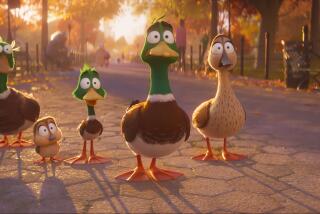It’s all about balance
- Share via
Over the past 17 years, Iranian director Majid Majidi has sought out everyday people to serve as the inspiration for films such as “The Color of Paradise,” “Baran” and the Oscar-nominated “Children of Heaven.” So in some ways it’s not surprising that his latest film -- the gentle fable “The Song of Sparrows,” opening Friday at Laemmle’s Music Hall in Beverly Hills and Laemmle’s Town Center 5 in Encino -- stems from a visit to an ostrich farm in the countryside, far from the hustle and bustle of Tehran.
“I encountered a man there who struck me as very pure, like clear water,” Majidi says through a translator on the phone from his home in Tehran. “He was someone who fascinated me. It’s as if he had a special relationship to the ostriches.”
In fact, the man was something of an ostrich whisperer. “It’s like he could talk to them. He got into fights with them and they made up,” Majidi says. “It’s amazing to me, because ostriches are very stupid animals to begin with.”
Majidi, 49, has discovered that the farther he gets away from the complexities of city life in Tehran, “more pure people remain. There is an essence to our humanity that is somehow preserved in all of these places, far removed from the city. You know today, with all this modernization and technology, we are becoming more distant from one another and ourselves.”
It’s no wonder then that “Song of Sparrows” revolves around a poor but good-hearted ostrich keeper, Karim (Reza Naji, who earned best actor at the Berlin International Film Festival), who loses his job when one of the birds escapes while in his care. To make matters worse, his hearing-impaired teenage daughter loses her expensive hearing aid.
Traveling into Tehran on an aging motorbike for work, Karim is mistaken for a taxi driver and begins earning money giving rides on the back of his bike. Between passengers, he begins to collect all sorts of useless odds and ends. Soon, Karim finds himself obsessed with these worthless accumulations and increasingly distant from his family and friends.
Majidi wants to make sure that audiences don’t see the film as an attack on modernization, pointing out that technology gives Karim’s daughter the ability to hear.
“Some people have tried to describe it as a conflict between tradition and modernity,” he says. “But the idea [of the film] is that modernization should be at the service of humanity. Instead, we increasingly find ourselves conquered by modernization. It’s like a monster that dominates our lives. Modernization should allow us to lead better lives and give us the wings so our spirits can soar.”
The film, he says, “is an invitation for us to return back to our shared humanity and those values. That’s the only way we can stand up and face the difficulties brought on by modernization. Otherwise, we simply become robots.”
As with his previous films, Majidi also explores the lives of children. Karim’s youngest son, for example, decides with his friends to clean an old water-storage area so they can breed goldfish and sell them to earn money.
“This story goes back to the nostalgia I have for my own upbringing,” Majidi says. “Goldfish have an important symbolic value, especially in the Persian New Year holidays. You can find a goldfish as part of the decoration for the New Year throughout Iran. But it’s also a business. It’s a business for kids in the south of Tehran. And as a child growing up in that area, I also sold goldfish for the Persian New Year.”
Though the children end up losing most of the fish in an accident, Majidi says, “they maintained the fish that will hopefully give birth to many more fish, and down the line they will be able to sell them.”
This subplot, he says, is a way of showing Karim “that he should never lose hope. . . . And one day through hard work he will be able to prevail.”
Of course, it also took a lot of hard work for Majidi to work with the film’s ostriches.
“They have tremendously big bodies and very small heads,” he says. “I think their brains must be the size of a small nut. Every time I look at an ostrich, I am reminded of politicians who have big bodies and big power but seem to often act in ways that reveal they have very small brains.”
--
More to Read
Only good movies
Get the Indie Focus newsletter, Mark Olsen's weekly guide to the world of cinema.
You may occasionally receive promotional content from the Los Angeles Times.










